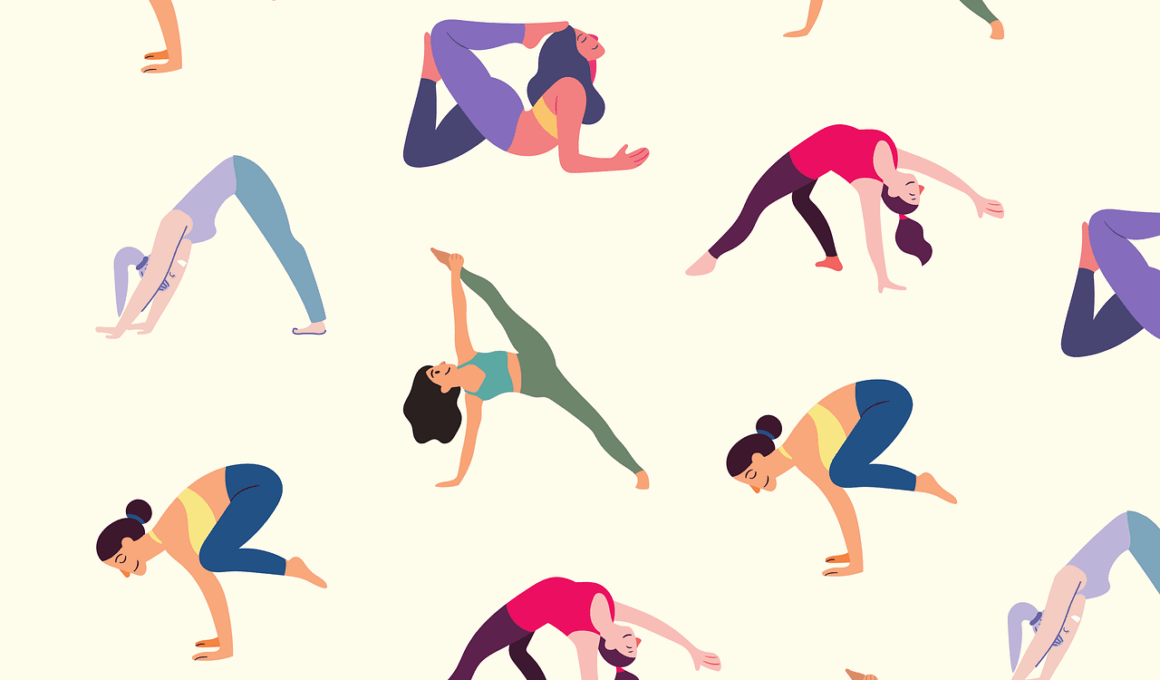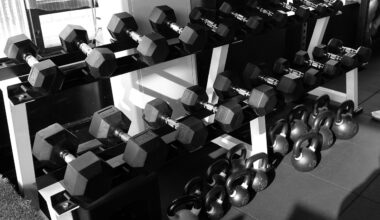Setting Realistic Goals for Your Pilates Journey as a Beginner
Beginning your Pilates journey can be exciting yet overwhelming. As a beginner, setting realistic goals is crucial for your success and perseverance. Instead of aiming for perfection, focus on gradual improvement. Start with simple objectives such as practicing once or twice a week. Track your progress and adjust your goals as you become familiar with Pilates. This approach helps establish a strong foundation, preventing injury and fostering consistency. Remember, it’s important to listen to your body and respect its limits while exploring various exercises. Setting achievable goals allows you to experience the benefits of Pilates without feeling intimidated. Consider enabling shorter result-driven timelines; for instance, instead of saying you want to master a specific pose, aim to learn the basic movements first. Celebrate small victories, such as improvements in flexibility and strength. Lastly, keep an open mind. Your initial goals may evolve over time as your skills develop and your body adapts to the practice. This flexibility in goal-setting will enhance your overall experience and promote sustained commitment.
While starting Pilates, prioritizing consistency over intensity can greatly benefit your journey. Attend classes regularly and maintain a dedicated schedule that fits your lifestyle, ensuring a balanced approach to your practice. Allocate specific days and times each week for your Pilates workouts. Creating a routine aids in developing the habit that is essential for progress. Additionally, make the practice enjoyable by varying the types of classes you attend. Explore different styles, such as mat Pilates, reformer, or beginner-friendly group sessions. Engaging in diverse classes keeps things fresh and encourages motivation. Consider working with an instructor who can provide personalized guidance and help set tailored goals to suit your personal ambitions. These professionals offer valuable insights and constructive feedback, which is especially beneficial for beginners. They can recommend modifications or challenges based on individual fitness levels. As you advance, revisit your original goals. Embracing an adaptive mindset will allow you to evolve your practice while maintaining a sense of satisfaction. Enjoying the process of improvement is just as important as reaching your objectives in your Pilates journey, as it enhances your overall well-being.
Understanding Your Body’s Limits
Understanding your body’s limits is essential as a beginner in your Pilates practice. Before pushing yourself too hard, take time to assess your physical condition and health. Listen closely to the signals your body sends during workouts. This awareness helps you identify what you can handle without risking injuries. Practicing mindfulness or body awareness techniques can assist in recognizing your own limits and capabilities. Focus on proper alignment and engage in exercises within your comfort range to develop a solid foundation. Techniques that emphasize breathing play a vital role in connecting your mind and body, allowing you to tune in to where you need to improve. As you progress, evaluate your movements and gradually increase the difficulty of exercises. However, strive to understand that mastering every pose is not a race; it takes patience and dedication. Keep in mind your previous goals, adjusting them as you become more proficient in your practice. Include restorative practices such as gentle stretching or yoga to help facilitate recovery while maintaining overall flexibility. Embrace this journey and regard your limits as stepping stones toward achieving more advanced goals over time.
Another key aspect of setting realistic goals in your Pilates journey is understanding your motivation. Why are you drawn to Pilates? Identifying your underlying reasons can provide direction and clarity as you set goals. Whether you’re seeking improved strength, flexibility, stress relief, or rehabilitation, acknowledging your motivation helps tailor your approach effectively. Write down your motivations and align them with your goals. This exercise fosters accountability and encourages consistent effort. Share your aspirations with friends or family for additional support; this can enhance commitment since external encouragement can be empowering. Utilize resources available to you, such as online classes or reputable Pilates websites, where you can access quality information and instruction. Don’t hesitate to explore community classes where you can connect with fellow beginners. Being surrounded by those with similar objectives creates a motivating atmosphere. Most importantly, be patient with yourself. Understand that progress may be slow at times, and that’s perfectly acceptable. Embrace the journey rather than focusing solely on the destination. Gradually, you’ll find yourself improving in ways you never expected, boosting your confidence in your abilities.
Adapting Goals as You Progress
As you continue your Pilates journey, adapting your goals becomes essential to align with your growth. Regularly assess your progress, identifying areas in which you improved and those requiring more focus. For example, if you’ve gained flexibility but struggle with strengthening certain muscle groups, consider refining your objectives accordingly. Set new benchmarks that are attainable yet challenging enough to keep you engaged. Connecting with experienced practitioners or instructors can provide insights into specific areas for growth. They may suggest various exercises targeting weak points, helping you optimize progress in your practice. Additionally, as you learn more about Pilates principles, consider exploring more advanced classes or workshops that can push your limits. Regularly challenging yourself promotes continuous growth and motivates you further. Remember to celebrate milestones, regardless of how small they may seem. By acknowledging your achievements, you reinforce positive behavior, making you more likely to stay committed to your goals. Acknowledge the journey itself. Each time you adapt your goals, the flexibility shows growth, determination, and enthusiasm for personal development in your Pilates practice.
Finally, incorporating self-reflection into your Pilates routine will empower your journey. Take time at the end of your sessions to reflect on what you’ve experienced physically and emotionally. Jot down your thoughts to help identify patterns, encouraging greater awareness of your progress. Self-reflection also strengthens your connection to your physical and mental well-being. Evaluate how certain exercises felt, where you succeeded, and what you found challenging. This insight allows for better goal-setting in future practices by emphasizing your unique needs. Remember to celebrate your successes, no matter how trivial they may feel. Reinforcing perseverance demands acknowledging both the challenges faced and the progress made. Relish the sense of achievement and personal growth that Pilates offers over time. If necessary, share your reflections with peers or instructors; they can provide additional perspectives on your experiences. Engaging in discussions surrounding your journey deepens your understanding of how Pilates fits into your lifestyle. Align your chosen culture surrounding Pilates with your training needs. Ensure Pilates continues serving your goals while adapting to your evolving preferences as a practitioner.
Conclusion and Moving Forward
In conclusion, setting realistic goals for your Pilates journey as a beginner is about finding balance, embracing progress, and understanding your limits. As you embark on this rewarding path, keep the focus on consistency, adaptability, and self-awareness. Each person’s journey is unique, and celebrating small victories along the way will help maintain motivation. Use your initial motivations as guiding lights while remaining open to new experiences and challenges that Pilates presents. Reflect regularly on your practice to evaluate progress, allowing your goals to shift as you grow. Remember, patience is key. Your body needs time to adjust and change, and respecting this process is essential for your long-term success. Build a supportive network of fellow practitioners or instructors to stay motivated and accountable. Lastly, enjoy every moment of your Pilates practice, as it contributes to overall physical and mental well-being. Moving forward, let your evolving practice serve as an adaptive journey tailored to your preferences. Set realistic, achievable goals as you further immerse yourself in the Pilates community and benefit from this incredible holistic practice.
In your Pilates journey as a beginner, setting realistic goals shapes your overall experience and development. Enjoy every aspect of growth and find fulfillment throughout this transformative practice.


